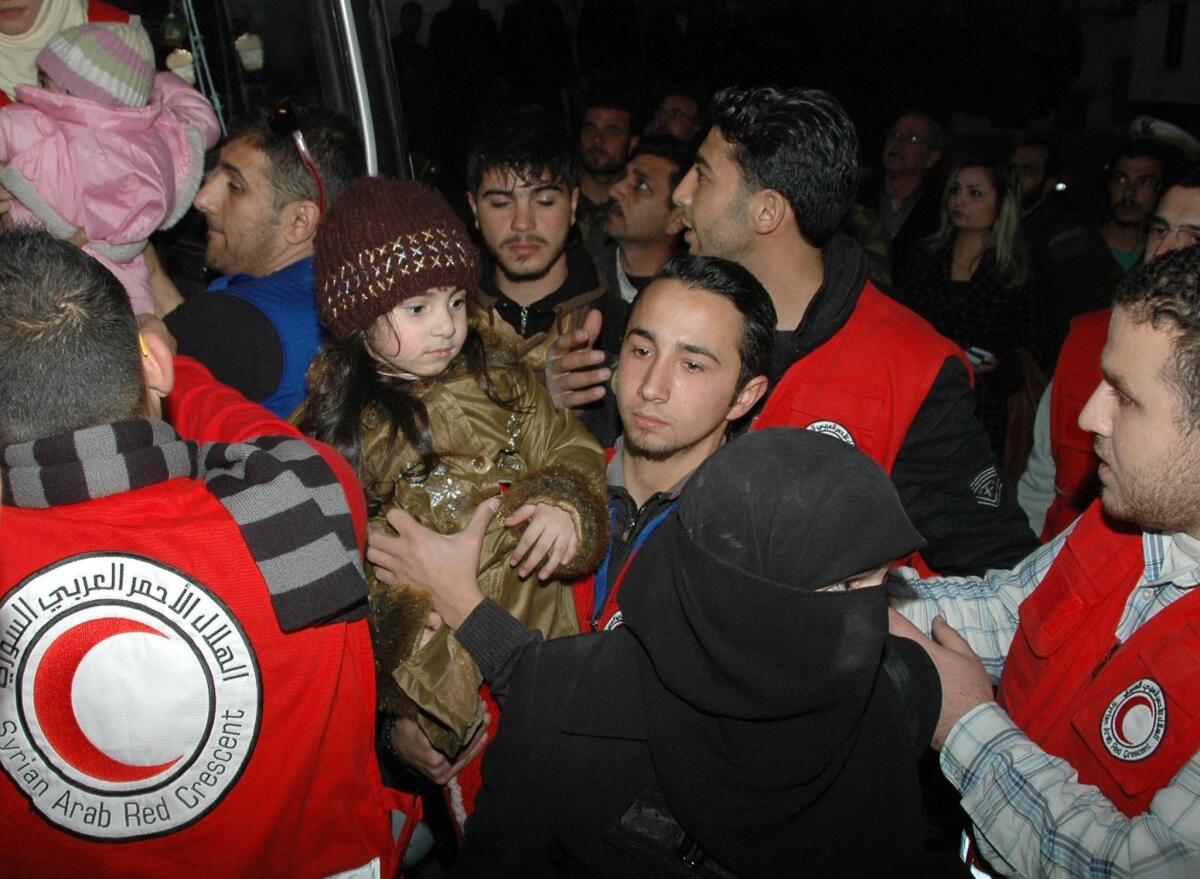Syria and rebels agree to extend rescue effort in city of Homs

- Share via
DAMASCUS, Syria — A plan to provide humanitarian aid to besieged residents in the Syrian city of Homs was extended Monday for three days, the United Nations announced, as a new round of Syrian peace talks began.
The U.N. said the fresh cease-fire was reached to allow for the delivery of aid and the rescue of more civilians from Homs’ Old City, which is under rebel control and has been cut off from the rest of the city for almost two years. It came on the heels of a three-day effort that began Friday.
The plight of more than 2,000 people believed to be trapped in the area of Homs without sufficient food and other staples has drawn global attention and emerged as a major concern during last month’s first round of peace talks in Geneva.
On Monday, the Syrian government said an additional 460 civilians, “mostly women and children and elderly people,” had been evacuated from Homs, the state media reported.
The extension of the humanitarian effort seems designed to build on the momentum of the just-concluded relief forays into the Old City.
“I hope this will allow us to evacuate yet more civilians and deliver much-needed additional supplies,” Valerie Amos, the United Nations humanitarian chief, said in a statement issued at the world body’s headquarters in New York.
The U.N. has been acting as both aid provider and mediator in negotiating the truces in Homs’ Old City between government and opposition forces.
During the three-day operation that began Friday, aid workers managed to bring out nearly 700 people and make the first delivery of food and medical supplies into the old quarter in more than 18 months.
However, officials said each day of the three-day operation saw serious cease-fire violations, including gunfire and mortar strikes targeting humanitarian convoys. At least 10 people were killed and dozens injured, while U.N. and Syrian Arab Red Crescent workers “were deliberately targeted,” Amos said. Four Red Crescent volunteers suffered slight injuries, the organization said.
Each side in the conflict blamed the other for the weekend attacks. There was no conclusive proof as to who was behind the strikes.
The Syrian government, under international pressure to open up aid access for millions of Syrians across the country, is keen to show it is cooperating with the U.N. on humanitarian matters in Homs. Syrian officials and their Russian allies have voiced concern that the aid issue could be used as a pretext for international intervention in Syria.
On the humanitarian front, Syrian authorities also have cited the lack of aid flowing into several rebel-blockaded areas, including the pro-government northern towns of Nubul and Zahra, together home to about 40,000 people.
Meanwhile, in Geneva, the second round of peace talks opened without the two sides meeting face to face. The U.N. mediator, Lakhdar Brahimi, held separate closed-door meetings with the Syrian government and opposition delegations. The first round of talks ended 10 days ago without accomplishing much beyond eventually getting the two sides in the same room.
The government delegation denounced the “massacre” by Al Qaeda-linked rebels of 42 civilians in the town of Maan in Hama province. The pro-opposition Syrian Observatory for Human Rights said 25 people, most of them members of a militia loyal to the government, were killed when Islamic fighters overran the town in an attack with sectarian overtones.
Also in Syria, officials of the U.N. and the Organization for the Prohibition of Chemical Weapons said Monday that a third shipment of Syrian chemical weapons material had left the country. The unspecified shipment, destined for destruction, was placed aboard a Norwegian cargo vessel, said the joint mission overseeing the elimination of Syria’s chemical stockpiles.
Damascus is slated to give up all its chemical weapons for destruction by June 30 under the terms of a U.N. resolution. The U.N. action followed an accord brokered by the U.S. and Russia that averted threatened American airstrikes on Syria in retaliation for its alleged use of chemical arms.
However, progress has lagged in recent months and U.N. officials have urged Syrian authorities to speed up the process of dismantling its arsenal. Syria says security concerns were behind the delays.
Twitter: @mcdneville
More to Read
Sign up for Essential California
The most important California stories and recommendations in your inbox every morning.
You may occasionally receive promotional content from the Los Angeles Times.













